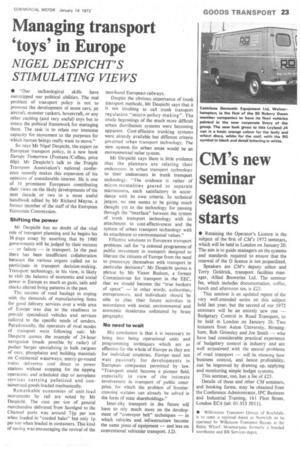Managing transport 'toys in Europe
Page 25

If you've noticed an error in this article please click here to report it so we can fix it.
NIGEL DESPICHT'S STIMULATING VIEWS
• -Our technological skills have outstripped our political abilities. The real problem of transport policy is not to promote the development of more cars, jet aircraft, monster tankers, hovercraft, or any other exciting (and very useful) toys but to create the political framework for managing them. The task is to relate our immense capacity for movement to the purposes for which human beings really want to move."
So says Mr Nigel Despicht, the expert on European transport policy, in a new book Europe Tomorrow (Fontana /Collins, price 60p). Mr Despicht's talk to the Freight Transport Association's national conference recently makes this expansion of his opinions of considerable interest. He is one of 16 prominent Europeans contributing their views on the likely developments of the next decade or two in a most useful handbook edited by Mr Richard Mayne, a former member of the staff of the European Economic Commission.
Shifting the power
Mr Despicht has no doubt of the vital role of transport planning and he begins his 36-page essay by asserting that by 1980 governments will be judged by their success — or failure — in transport. In the past there has been insufficient collaboration between the various organs called on to participate in transport decision-making. Transport technology, in his view, is likely to shift the balance of economic and social power in Europe as much as guns, sails and clocks altered living patterns in the past.
The success of road haulage in coping with the demands of manufacturing firms for good delivery services over a wide area of Europe was due to the readiness to provide specialized vehicles and services tailored to the specific needs of senders. Paradoxically, the operators of rival modes of transport were following suit: Mr Despicht quotes the example of 24-hour navigation (made possible by radar) of pusher barges specializing in bulk cargoes of ores. phosphates and building materials on Continental waterways; merry-go-round trains delivering coal direct to power stations without stopping for the tipping operation; and scheduled ship or aeroplane services carrying palletized and containerized goods loaded mechanically.
Remarkable economies of unit-load movements by rail are noted by Mr Despicht. The cost per ton of general merchandise delivered from Scotland to the Channel ports was around 7ip per ton when loaded in "corded bales" but only lp per ton when loaded in containers. This kind of saving was encouraging the revival of the moribund European railways.
Despite the obvious importance of trunk transport methods, Mr Despicht says that it is not insulting to call trunk transport regulation "micro-policy-making". The crude beginnings of the much more difficult urban distribution systems were becoming apparent. Cost-effective trunking systems were already available but different criteria governed urban transport technology. The new system for urban areas would be an environmental value system.
Mr Despicht says there is little evidence that the planners are relating their endeavours in urban transport technology to their endeavours in trunk transport technology. "The evidence is rather of micro-mentalities geared to separate microcosms, each satisfactory in accordance with its own criteria. In technical jargon, no one seems to be giving much thought yet to the technology for passing through the "interface" between the system of trunk transport technology with its attachment to cost-effectiveness and the system of urban transport technology with its attachment to environmental values."
Effective solutions to European transport problems call for "a colossal programme of public investment in transport designed to liberate the citizens of Europe from the need to preoccupy themselves with transport in particular decisions". Mr Despicht quotes a phrase by Mr Victor Bodson, a former Commissioner for transport in the EEC, that we should become the "true bankers of space" — in other words, authorities,. entrepreneurs, and individuals should be able to plan their future activities in accordance with social, environmental and economic desiderata unfettered by brute geography.
No need to wait
His conclusion is that it is necessary to bring into being operational units and programming techniques which are as effective for the whole of Europe as they are for individual countries. Europe need not wait passively for developments in European companies permitted by law. "Transport could become a pioneer field, especially in view of the intimate involvement in transport. of public enterprise, for which the problem of frontiercrossing statutes can already be solved in the form of state shareholdings."
Inter-city transport in the future will have to rely much more on the development of "conveyor belt" techniques — in which vehicles and infrastructure become the same piece of equipment — and less on conventional vehicular transport. J.D.
















































































































